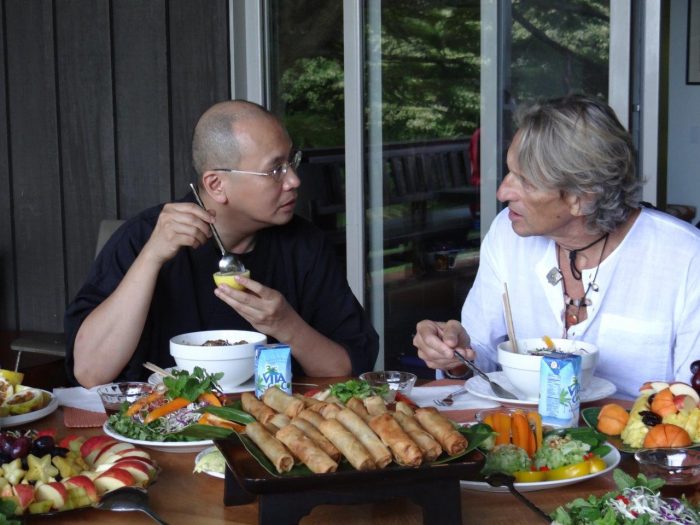~
If eating only a single meal a day before noon, the “Bhikshu Diet,” is a diet, why are so many Bhikshu fat?
Eating a single meal before noon is connected to an entire lifestyle and can work when employed as a support for that lifestyle’s aims, but those aims are very frequently lost to monks—much more so to us laymen.
Rather than examine the aims of a monastic lifestyle, which most are familiar with and is beyond the scope of this inquiry, let’s focus on the aims of a Bhikshu diet and what we can expect it to achieve for us if we decide to try it.
The primary reasons the Buddha included eating a single meal before noon in the 250 precepts for ordained monks, and 350 for ordained nuns are:
1. Using restraint of food intake to strengthen the mind.
Training the mind to turn away from food helps it to remain undistracted on a meditation topic.
2. Economy of time.
Eating once means less time spent in the kitchen—or begging—less time eating, and less time cleaning up afterward.
3. Economy of energy.
Digesting food requires energy that could be used for self-inquiry.
4. Greed.
Better to be greedy once a day, if you are going to be greedy, then three times.
5. Better health.
Eating a single time puts less strain on the body and less waste.
The Bhikshu diet in recent times has been used as a “diet” with some short-term success. However, it was never meant as a short-term solution to being overweight, but a discipline that fits into an entire way of life wherein transformation evolves through the entire spectrum of desires. In short, when the domino of food craving falls, everything else falls across the board.
A fat monastic is fat because of the difficulty in keeping the practice of eating once a day in its intended form. The primary intention is to turn the mind away from cravings and be thorough enough in the effort that eventually cravings cease to arise. Indulging in the “loopholes”—such as sweet drinks, juices, sodas, fruit drinks, and even (supposedly allowed) little squares of chocolate when energy reaches lows—only assures that the benefits of a single meal will be lost.
Most monastics are aware of this danger and either vow to take only water afternoon, and a glass of juice or tea in the morning; or they are careful to take boring drinks between meals, tea, coffee, no milk, or no sugar.
Many modern dieters are astute to follow the Bhikshu diet in its purity, which is easy given their short-term ambitions, but monks are “lifers,” and we cannot be unsympathetic that they falter.
For a monk, his meal is the main event of his day.
As laypeople considering the Bhikshu diet, it would be best to challenge ourselves to make a bigger commitment to the diet to realize its broader benefits. We cannot realize how much time, energy, and mental resources are wasted eating until we “go Bhikshu.”
Food, like sex, is a biological concern hardwired into our thinking.
We are programmed to these addictions so thoroughly that we think it is supposed to be that way. Once we go against the flow, we will realize just how strong the current is. To succeed we must use all our mental resources to resist the downward pull and instead absorb our mind elsewhere.
For the monk, it will be meditation and study. What it will be for us is as varied as the people on the planet; but whatever it may be, we will of necessity have to go deeper and further than we ever had before and preempt old cravings from hijacking our efforts.
Going Bhikshu is an exotic and whimsical idea. My advice for anyone considering going Bhikshu would be to commit to it fully, or not bother trying it at all. It takes time for the body and mental signals to adapt and form new programming.
If we are unwilling to commit to three to six months, we should banish the idea completely, and revisit it when we feel willing to give ourselves fully to it.
I was a Bhikshu from 1972-1982 and not only ate once a day before noon, but only took water after noon. I married within three years of ending my Bhikshu career but kept eating once a day until my children were becoming teenagers and wanted me around the dining table.
Now, they are grown, and I have been back to eating once a day ever since I joined a monk friend (pictured with me in the photo accompanying this essay) for a meal about five years back.
I love the practice, the way it makes me feel more capable, less distracted, and more given to thoughtfulness. I like the extra time in my day, too, the extra two or three hours means a less cramped day.
If there is anything that stimulates creativity, it is eating less. If you have never taken up the practice of eating one meal a day before noon, you will think it is only about “diet,” but it is not. It is about freeing ourselves from the constraints rooted in food that shadow us throughout the day.
Somewhere in the back of our mind food is always there, and those thoughts, whether we are conscious of them or not, will reduce our effectiveness in everything we do. The other consideration is time. If you eat once a day, it is practical, it offers more time to do things, and since these things will be in lieu of eating we will be more concerned with the meaningfulness of what we do.
If you want to “diet,” there are much better diets out there than the Bhikshu diet. But if you want a complete overhaul, the Bhikshu diet is the way to go.
~









Read 15 comments and reply